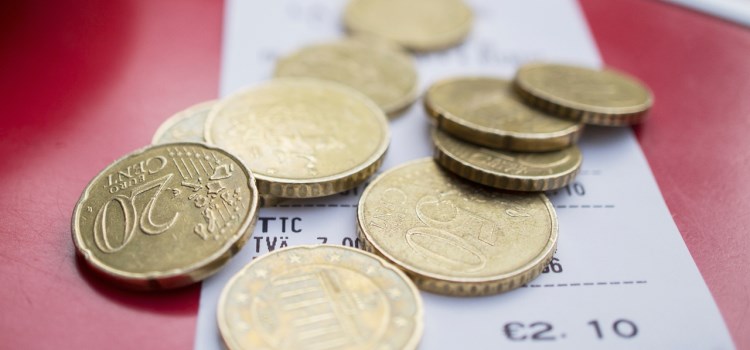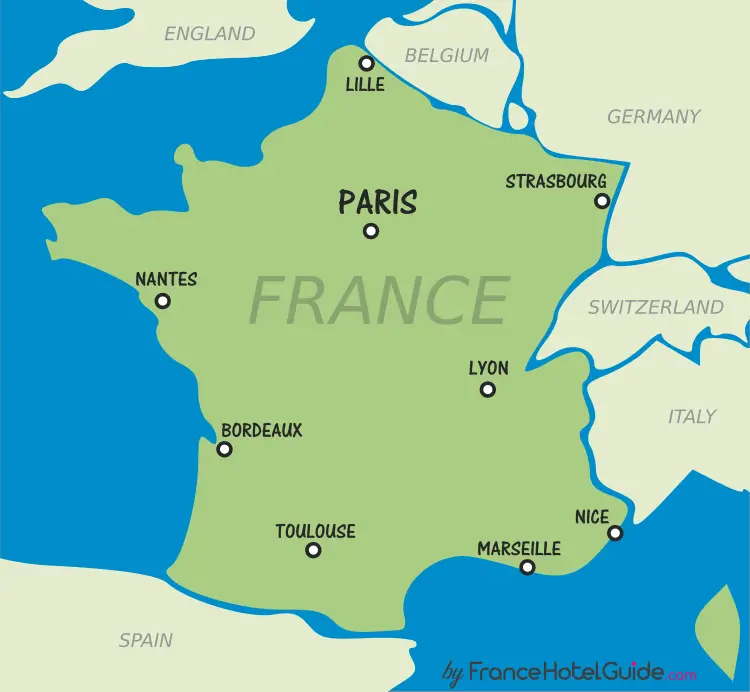What to know before arriving in France
What are the best dates in order to travel and discover France? Do I need a visa? How is the climate in France and what type of clothing should I take with me ? Is my adaptater going to work with the french plugs? Shall I tip the waiters?
With this France practical mini-guide you will have all information you need to peacefully travel and enjoy your stay in France.

With this France practical mini-guide you will have all information you need to peacefully travel and enjoy your stay in France.

Entry requirements
- If you are a European or Swiss citizen, you can move freely in France for a maximum period of 3 months. Beyond that, you need to apply for a residence permit valid for 5 years.
- If you are not, you must have a valid passport but a short stay visa is no longer required. There are exceptions and special cases, to check with the French embassies or consulates.
- Students may be subject to specific rules.
Travel insurance
- If you are a citizen of a member country of the European Union or Switzerland, you should be in possession of the European health insurance card to benefit from the medical care. You must make a request to your health insurance concerning this, prior to your departure for France.
- If you are not a citizen of a member country of the European Union, you can have the same rights like the French with regards to insurance, but there are several specific statutes, so it is important that you check your status with your local social security or private insurance.
Currency
- The Euro (€) is the official currency in France. Current exchange rates may be checked on the currency converter
Duty free shopping
- If you live outside the European Union, you are entitled to a 12% rebate in tax on certain items, provided that the amount of your purchases be higher than or equal to 175 including sales tax (VAT) and that these purchases are made on the same day in the same shop. You can also benefit from this rebate if all the goods are bought in different shops of the same store chain and in the same city. Keep a receipt of your purchases (whether or not duty free), should your local customs inspector request them when you return home.
- Be careful: rebates in tax are optional. Sellers will inform you if they do it or not.
Tipping

- Tipping in restaurants and bars is not obligatory in France, if you enjoyed the treat given to you, you can leave a tip with any amount of your choice (between 1 and €2 in general).
- A small tip can also be given to taxi drivers, deliverymen, the hairdresser or porters at hotels, if you are satisfied with the service.
Time
- Summer time is GMT+2 and applies from the last sunday of March to the last sunday of October. Winter time is GMT+1.
-
Paris Time:
GMT +1 :
GMT +2 :
Surface Area
- The French population is 66 627 602 inhabitants (about double the population of California)
- Paris has a population of 2 254 262 inhabitants
- Paris has a population of 2 254 262 inhabitants
- Marseille has a population of 864 323 inhabitants

Population and density
- France is the most visited country in the world, with 83.8 million arrivals of international tourists per year.
- Paris is the most visited city in France with 30 million tourists per year.
- Lourdes and Lyon each welcome 6 million tourists every year.
- The Paris Disneyland Park welcomes 14.2 million visitors each year.
- The Puy in the Fou leisure park on history situated in Vendée hosts 2 million visitors per year, meanwhile the Asterix Park has 1.8 million visitors per year.
Tourist visits

- France is the most visited country in the world, with 83.8 million arrivals of international tourists per year.
- Paris is the most visited city in France with 30 million tourists per year
- Lourdes and Lyon each welcome 6 million tourists every year.
- The Paris Disneyland Park welcomes 14.2 million visitors each year.
- The Puy in the Fou leisure park on history situated in Vendée hosts 2 million visitors per year, meanwhile the Asterix Park has 1.8 million visitors per year.
Credit card
- If you are a resident of the European Union, you will benefit the same rules that apply in your country when you use your card.
- If you are a resident of a non-European country, your bank may charge you a fee calculated in proportion to the amount paid (between 2% and 3%) and sometimes a fixed share (between 0.30 and 4 euros) on your withdrawals and / or your card payments.
Health
- If you are a resident of a country of the European Union, you just need to request for your European Health Insurance Card.
- If you are a non-European visitor and happen to have a health problem in France, you will not be covered. Remember to keep medical bills (doctors or hospitals) in order to get a refund back in your country.
- You can subscribe before your stay, accident and health guarantee. It helps you get a reimbursement of incurred care costs during your stay and compensation for damage.
Vaccines
- The compulsory vaccinations in France are the universal vaccines: vaccine against polio, diphtheria and tetanus.
- The pertussis, tuberculosis (BCG) vaccines, and MMR (measles, mumps and rubella) are also recommended in France.
Animals
- Few hotels accept animals without further complications. For big dogs, you have to inquire and alert at the booking time. Small pets are generally more easily accepted. Sometimes, you have to pay an extra amount.
- You will be required to have a European passport for the animal (issued only by a veterinarian), this document must bear a certificate of vaccination against rabies. The European passport is the only document that can certify the rabies vaccination for dogs and cats.
- Your pet must have a chip. In France, identification is compulsory for dogs, cats and ferrets.
- By plane : The animal must be declared at the time of booking by specifying the species and breed. Dogs and small cats are generally accepted in the cabin as hand luggage, but those of a more significant size will go in the hold (safe for them). Make sure to present yourself early enough at the airport in order to complete the procedures for the animal.
- By plane : The animal must be declared at the time of booking by specifying the species and breed. Dogs and small cats are generally accepted in the cabin as hand luggage, but those of a more significant size will go in the hold (safe for them). Make sure to present yourself early enough at the airport in order to complete the procedures for the animal.
- By Bus : Bus companies generally agree to carry small pets provided they are in a cage. Very often, big dogs are not allowed.
- By ship : Depending on the company selected, animals can generally travel in a reserved zone. It is also possible to leave your dog in the car if the car as well is on the boat. In this case, the trip is free for the animal.
- By taxi : With the exception of guide dogs, the driver is entitled to refuse the animal on board. It is often easier to order a taxi that accepts pets.
Customs
- All foreign nationals who wish to come to France must be able to present at the border regulatory documents indicating the purpose of stay, their livelihood and accommodation conditions.
- It is required that you fill out a customs declaration and pay duties and taxes for goods purchased, even reserved for personal use or as presents, if their value exceeds these franchises.
Trips (plane, car, train, bus)
- Cars : To drive in France, you must be in possession of your national driving license (international if you are not a citizen of the European Union) of the registration document called “carte grise” and an insurance certificate. In France, you could also rent a car if you are 21 years and above and your driving license is at least 1 year old. You will find a rental company at each airport and in most countries of the stations.
- Trains : Dense and highly centralized, the French rail network is certainly the most practical means of transport... Every major city has a network to its suburbs. The most important cities are connected by TER (regional express trains) and TGV (high speed train).
- Airplanes : Many cities have an international airport and daily connections with Paris. Air France, the national airline, connects most major cities to Paris several times a day in an hour on average and the provincial cities between them. The main airports in France are located in: Paris, Bordeaux, Lyon, Marseille, Nice, and Toulouse. The largest international airport in France is Paris (Charles de Gaulle).
- Coaches, buses main lines : The Eurolines network is very well developed and serves all European capitals from Paris. Companies like Ouibus or Isilines also allow travel through France without breaking the bank.
Driver's license
- If you are coming to France for a short stay (for a vacation, for example), you can drive with your license. It must be valid and written in French, you can drive with the original version but should be backed with its translation or an international license.
The Highway Code
- European driver : In France, an infringement on the highway will most likely result in one being prosecuted and punished back home (except in Ireland, the United Kingdom and the Denmark). Highway infringements include: speeding, failure to wear seat belt, crossing of a red light, driving while intoxicated and under the influence of drugs, not wearing a helmet, using a cellphone while driving.
- Non-European driver : The perpetrator under the Highway Code may be required to immediately pay a fixed fine.
- Some traffic rules in France : The speed limit is 50km / h in town, 90km / h on roads and 130km / h on motorways. The minimum driving age is 18 years. Driving is on the right. Wearing seat belts is compulsory in the front seats, as well as the back seats.
Using a cell phone even with a hands free kit is prohibited. The permitted blood alcohol level is 0.25 mg per liter of exhaled air and 0.1 mg for young drivers. It is mandatory to have in the cockpit of his car a fluorescent safety vest and a hazard warning triangle.
Car Rentals
- In France, to be able to rent a car, you must be : 21 years, have a 1 year old license, be able to present proof of identity (passport, identity card) to the tenant and should also provide the original copy of your driver's license.
- Key car rental agencies in France : Europcar, Avis, Hertz, Sixt, Rentacar
Gastronomy in France

If you are a real gourmet, here are some typical dishes of the French gastronomy:
- Potato Gratin : A popular French dish consisting of potatoes that taste it as or as an accompaniment.
- Bouillabaisse : Typical Marseilles dish, consisting of a fish soup that is eaten with croutons often balks garnished rolls, rust, served whole, with Irish potatoes.
- “Pot au feu” : This dish is one of the iconic dishes of the gastronomic French meal. It is a dish made of beef lengthily cooked at low heat in a broth flavored with vegetables.
- Bourguignon Beef : Bourguignon beef is a recipe made from beef, traditional Burgundian cuisine cooked in red wine of Burgundy.
- Frog leg : A dish of frog legs prepared with garlic, butter and parsley.
- Burgundy Snail : Another traditional dish prevailing from Burgundy, snails are merged in garlic, butter and parsley.
- Ratatouille : Ratatouille is a Provencal culinary specific to the Nice region, basically vegetables and spices.
- Quiche Lorraine : Traditional dish of the Alsace-Lorraine region, the Quiche Lorraine is made from puff pastry, migaine of eggs, sour cream and bacon.
- Rooster in wine : A dish offering a mixture of rooster flavors, French emblem and wine specialty, represents the excellence of French gastronomy.
What to take (clothes)
Average temperatures in France are 5 degrees in winter and 20 degrees in summer. So you must dress you accordingly.- In winter : Even if it doesn’t snow every day, France is quite cold in winter. It’s usually more comfortable in the half North then the half South which. Go for warm clothes anyway.
- In fall/spring : In the half North, the rains are frequent during these seasons, so make sure to have an umbrella. Rain showers are generally not long or strong, but sudden. In half South, the previous and next seasons could be very pleasant. T-shirts can be taken out of the closets.
- In summer : The climate is quite mild in summer, so most of the time you can stroll in t-shirt and shorts. Southern France may be warm (slightly above 30 °).
Key phrases in French
Hello" = "Bonjour" or "Salut" (more colloquial)"Goodbye" = "Au revoir" or "Salut" (more colloquial)
"Thank you" = "Merci"
"Do you speak English" = "Parlez-vous Anglais?" (prononced roughly as "parley voo Anglay")
"Yes" / "No" = "Oui" / "Non"
"Cheers!" = "Sante!""
Standards / Measures / Conversions
- Electricity standards:
- Single phase voltage: 220-230 V / Frequency: 50Hz. These standards are the same as for the rest of Europe, including the UK and Ireland.
- Plug type: Type C. This two-wire plug is ungrounded and has two round prongs. It is popularly known as the europlug. This is probably the single most widely used international plug. It is used in all countries of Europe except the UK, Ireland, Cyprus and Malta.

- Weights and measures: Metric
- Temperature: Celsius (°C)
- Conversions:
- Weight
1kg = 2.2lb
1lb = 0.45 kg
1g = 0.04oz
1oz = 28g
- Volume
1L = 0.26 US gallon
1 US gallon = 3.8L
1L = 0.22 imperial gallon
1 imperial gallon = 4.55L
- Distance
1cm = 0.39inch
1inch = 2.54cm
1m = 3.3ft = 1.1yd
1ft = 0.3m
1km = 0.62 mile
1mile = 1.6km
- Temperature
1°F = 1.8°C + 32
Exemple: 0°C is equal to 32°F and 20°C is equal to 68°F
(20 x 1.8 = 36 ; 36 + 32 = 68)
Public holidays
Fixed Date National Public Holidays
| January 1st | New Year's Day (Jour de l'an) |
| May 1st | Labor Day (Fête du Travail) |
| May 8th | WWII Liberation Day |
| July 14th | Bastille Day (Fête nationale) |
| August 15th | Assumption of the Blessed Virgin Mary (Assomption) |
| November 1st | All Saints Day (La Toussaint) |
| November 11th | Armistice Day (L'Armistice) |
| December 25th | Christmas Day (Noël) |
Weather forecasts and statistics
PARIS Average Temperatures and Rain Falls (1°F = 1.8°C + 32)
| Month | Jan. | Feb. | Mar. | Apr. | May | June | July | Aug. | Sept. | Oct. | Nov. | Dec. |
| Maximum (C°) | 7 | 8 | 12 | 16 | 20 | 23 | 25 | 25 | 21 | 16 | 11 | 8 |
| Minimum (C°) | 3 | 3 | 5 | 7 | 11 | 14 | 16 | 16 | 13 | 10 | 6 | 3 |
| Mean (C°) | 5 | 6 | 9 | 12 | 16 | 19 | 21 | 21 | 17 | 13 | 9 | 6 |
| Rain Fall (mm) | 51 | 41 | 48 | 52 | 63 | 50 | 62 | 53 | 48 | 62 | 51 | 58 |
| Wet Days (>25mm) | 17 | 14 | 12 | 13 | 13 | 12 | 12 | 13 | 13 | 14 | 15 | 16 |
LYON Average Temperatures and Rain Falls (1°F = 1.8°C + 32)
| Month | Jan. | Feb. | Mar. | Apr. | May | June | July | Aug. | Sept. | Oct. | Nov. | Dec. |
| Maximum (C°) | 6 | 8 | 13 | 16 | 21 | 25 | 28 | 27 | 23 | 17 | 11 | 7 |
| Minimum (C°) | 0 | 1 | 4 | 7 | 11 | 14 | 17 | 16 | 13 | 9 | 4 | 2 |
| Mean (C°) | 3 | 5 | 9 | 12 | 17 | 20 | 23 | 22 | 19 | 12 | 8 | 5 |
| Rain Fall (mm) | 42 | 44 | 50 | 75 | 91 | 76 | 64 | 62 | 88 | 99 | 82 | 55 |
| Wet Days (>25mm) | 15 | 12 | 11 | 11 | 13 | 11 | 10 | 11 | 11 | 12 | 14 | 14 |
MARSEILLE Average Temperatures and Rain Falls (1°F = 1.8°C + 32)
| Month | Jan. | Feb. | Mar. | Apr. | May | June | July | Aug. | Sept. | Oct. | Nov. | Dec. |
| Maximum (C°) | 16 | 17 | 21 | 22 | 27 | 31 | 32 | 30 | 28 | 26 | 23 | 18 |
| Minimum (C°) | 4 | 5 | 6 | 10 | 11 | 15 | 17 | 16 | 15 | 17 | 9 | 2 |
| Mean (C°) | 11 | 11 | 13 | 16 | 17 | 22 | 23 | 22 | 22 | 22 | 17 | 11 |
| Rain Fall (mm) | 43 | 32 | 43 | 42 | 46 | 24 | 11 | 34 | 60 | 76 | 69 | 66 |
| Wet Days (>25mm) | 8 | 6 | 7 | 7 | 8 | 4 | 2 | 5 | 6 | 8 | 9 | 10 |



